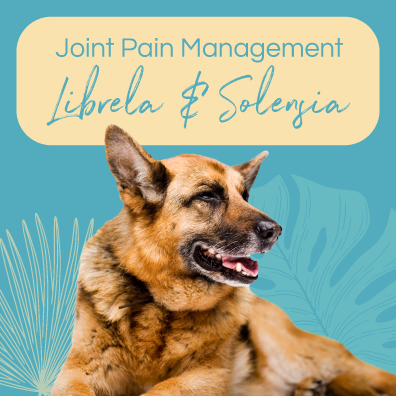
Despite their slowing pace, our senior cats and dogs occupy a cherished place in our families. As our animal companions become seniors, they might be showing signs of limited mobility, altered mobility, and joint pain. While these are natural experiences, it is key to recognize signs of pain and take action. With regular joint pain management implemented, you can provide a top-shelf quality of life as they enjoy their golden years.
Have you noticed subtle changes in behavior?
Now that they have entered their geriatric period, you may notice some changes in your sweet seniors. They may be reluctant to climb stairs, jump, or engage in activities they once enjoyed. You might notice stiffness, limping, or difficulty getting up after resting. Cats may avoid jumping onto furniture, while dogs may struggle with walks, appear less playful, and pant excessively for inexplicable reasons. Other signs may include irritability, licking or chewing at painful joints, and changes in posture or gait.
What is causing their joint pain?
Imagine the area where two bones come together at a joint. The two bones are connected by a fibrous membrane called a joint capsule. Due to aging, dogs and cats may acquire degenerative conditions such as arthritis, which causes abnormal stretching of this joint capsule. Your companion animal’s body naturally works to prevent this type of motion from occurring. The body responds as it would if an acute injury occurred ( imagine a broken bone, for example). The body discourages motion in this area by releasing nerve growth factor (known as NGF), which makes the affected area highly sensitive and extraordinarily painful. In the case of an injury, this pain only exists for a short period, and fades with healing. Unfortunately in the case of degenerative joint diseases, the pain is chronic and will continue life-long without intervention.
What can be done about joint pain that comes along with old age?
Fortunately, treatment to alleviate joint pain has become more simple, and safe. Librela, used for dogs, and Solensia, designed for cats, come in the form of a monthly injection which enters the skin, and is absorbed into the bloodstream. In the bloodstream, monoclonal antibodies bind together and neutralize nerve growth factor (NGF), which is the source of pain. These therapies typically take about 2 treatments until patients begin to feel the results.
How is an MA (monoclonal antibody) therapy different from other treatments?
- Treats Pain: MA’s are FDA approved to treat osteoarthritis pain. They are far more effective than supplements like Adequan, Dasuquin, or Cosequin. Joint supplements are a good long term strategy to limit degeneration. Then, Librela or Solensia is used to treat the pain patients are currently experiencing.
- Easy on The Organs: As patients requiring this therapy are elderly, it’s not uncommon for them to have comorbidities such as kidney or liver disease. For these patients, other pain management solutions such as NSAIDs (non-steroidal anti-inflammatory drugs) are not ideal, as they put pressure on these already weakened organs. Librela or Solensia do not.
- Easy Maintenance: One MA injection is administered every 4 weeks. For many families, this is easier to manage than trying to convince their cat or dog to swallow a tablet on a regular basis.
If you believe your elderly animal family member may be experiencing pain due to joint and mobility issues, the team at Pilina Vet is glad to help!